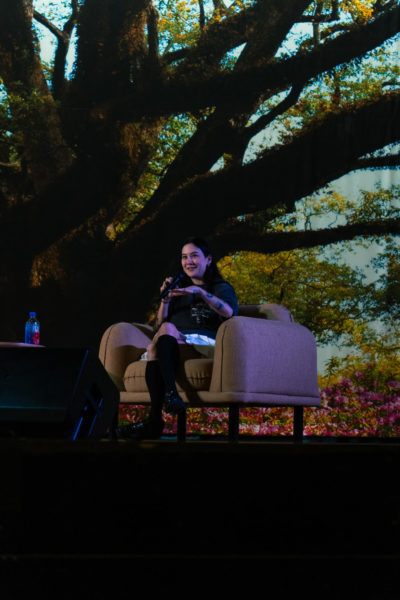As an artist, Michelle Zauner is hard to pin down. In the alternative and indie pop sphere, she is known as the lead singer of the band Japanese Breakfast. In literary circles, she is known as the author of the memoir “Crying in H Mart,” which received widespread acclaim and status as a 2021 New York Times bestseller. Recently, she has journeyed into the world of screenwriting and film scoring, with a movie adaptation of her memoir currently in production.

When Zauner visited Tulane on Wednesday, Sept. 13 for a moderated talk, her audience consisted of fans of all of her artistic media. The event — which included a giveaway of her most recent LP “Jubilee” and a copy of “Crying in H Mart” — was a collaboration between Tulane University Campus Programming and the Asian American Student Union.
“We want our events to appeal to as many students as possible,” TUCP president Isabel Kaufman said. “For some people, I’m like, ‘Japanese Breakfast, Grammy-nominated musician!’… and then for some people, I’m like, ‘Best-selling memoirist!’… and for some people, I straight up just yelled ‘Free event,’” they said, discussing promoting the event on McAlister Place.
The version of Zauner I was most acquainted with was that of her music: her singing voice has a heady, childlike quality, which is often set against a backdrop of lyrical depth. On stage, however, I saw a different person than I had imagined: Zauner couched herself back in the corner of her chair, exuding a cool and mature air. Her look displayed a similar set of contrasts: she sported black knee-high socks, a white miniskirt, a baggy gray tee and a sleeve of tattoos. Opposite her moderating the talk was Karisma Price, professor of English at Tulane.
Price, a poet by training, lauded Zauner on her vibrantly written prose, especially her descriptions of the meals her mother cooked. Growing up in Oregon with a Korean mother and a white father, food was one of the main ways that Zauner connected with her Asian identity and with her mother, who did not always radiate the same warmth of the dishes she cooked. In the essay originally published in The New Yorker that gave her memoir its title, Zauner described H Mart — the Asian supermarket chain where she and her mother would buy groceries — as a “beautiful, holy place” where you can “find something you can’t find anywhere else.”
Nowadays, she cries in H Mart because of something that can no longer be found there. Her mother passed away in 2014 after battling pancreatic cancer, taking with her Zauner’s access point to her Korean heritage. In the same essay, which also serves as her book’s opening chapter, Zauner asks herself, “Am I even Korean anymore if there’s no one left in my life to call and ask which brand of seaweed we used to buy?” The rest of the memoir is an examination of this question, as well as an evocative, unflinching and deeply introspective depiction of the ravages of cancer and the grieving process that follows the death of a parent.
“The way that she writes about grief and healing and how they can contribute to somebody’s creative process is a message that anybody can take something from,” Kaufman said.
Food was just as central at the event as it is in “Crying in H Mart.” Zauner proffered her preferences on kimchi, and in turn, Price introduced her to New Orleanian delicacies like king cake and snoballs. As a testament to food’s unique power to bring people together, it was in the discussion about snoballs that students began to call out the most absurd flavors they had tried — including the unholy combination of pickle topped with jalapeño — and this seemed to cause Zauner to open up to the audience.
Some other notable questions and answers:
Some sounds she loves: the “childishly tragic” tone of the harmonica and the sound of fists hitting each other during the hand jive.
Some sounds she hates: the sound of sports on TV and the sound of her husband — and bandmate, Peter Bradley — practicing guitar.
An album she wishes she could have made: any album by Björk or Radiohead.
A writer she wishes she could write like: Hemingway. “I wish I could write like that bastard,” Zauner said.
With over 200 people in attendance on a Wednesday night, it is undeniable that Zauner has a following at Tulane. But for Kaufman, abiding by the TUCP motto of “the best entertainment for students, by students” means going beyond choosing artists with the widest appeal as a result of their fame or their cross-disciplinary talent: it means representing all parts of the student body.
“It’s no secret that Tulane is a PWI, and Tulane on the surface level is not that diverse of a school,” Kaufman said. “I love bringing in speakers from different backgrounds who are success stories and who are these amazing people who have faced different obstacles because of their identities.”
Despite the challenges Zauner has overcome on her path to fame, she continually imposes new challenges on herself. Her next artistic venture after the film adaptation of “Crying in H Mart” will involve her moving to Korea in preparation for writing her next book, which will focus on the process of language learning and cultural assimilation.
This was Zauner’s first time at Tulane or in New Orleans, so maybe she picked up on some of the culture and lingo here.
I like to think that she already has a Tulanian spirit to her: if she were a student in the crowd, she would almost certainly be one of the intrepid double or triple majors that are easy to come by on campus.



